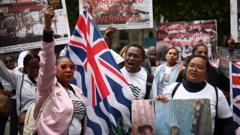The deal aims to strengthen national security amid rising geopolitical tensions, but raises questions about the future for the Chagossian community.
**UK and Mauritius Reach £101m Deal Over Chagos Islands: A New Chapter in Sovereignty**

**UK and Mauritius Reach £101m Deal Over Chagos Islands: A New Chapter in Sovereignty**
UK signs a landmark agreement to transfer sovereignty of the Chagos Islands to Mauritius while maintaining military operations on Diego Garcia.
The UK government has officially signed a deal worth £101 million per year to transfer sovereignty of the Chagos Islands to Mauritius while retaining control over a crucial military base on Diego Garcia. Prime Minister Sir Keir Starmer announced the agreement as vital for the long-term security interests of the UK, amidst concerns regarding geopolitical dynamics, particularly with China.
Under the terms of this landmark agreement, Mauritius will gain full sovereignty over the islands, allowing the UK and its ally the US to continue military operations on Diego Garcia for an initial 99 years. Starmer emphasized the urgency of the decision, stating that failure to act could have jeopardized the future of the military base and led to possible Chinese military encroachments in the region. The Conservatives have not welcomed the deal, labeling it an instance of national self-harm that could expose the UK to greater risks.
The financial commitment implies a net cost of £3.4 billion over the deal’s duration, adjusted for inflation. Starmer reassured the public that military assets in the Indian Ocean would remain secure thanks to the reinforced buffers around Diego Garcia—any constructions within this 24-mile zone will require UK consent. Additionally, foreign military interventions on surrounding islands will be restricted, giving the UK a significant veto over access.
In a twist to negotiations, the UK was able to dismiss a last-minute legal challenge posed by two Chagossian women wishing to return to their homeland. Reflecting the community’s divided stance, while some welcomed Mauritius's triumph in this deal, others expressed concern about their exclusion from decision-making and the potential consequences of resettlement under Mauritian sovereignty.
Mauritius Prime Minister Navin Ramgoolam celebrated the agreement as a historic victory for the country. Chagossians in the diaspora overjoyed by this legislative development voiced hope for a return to their ancestral homeland, echoing sentiments of empowerment. However, many in the community insist on the necessity of ensuring their rights during this transition and remain skeptical about Mauritius’s intentions regarding resettlement.
The Chagos Islands have a complicated history, as they were forcibly removed from Mauritius during colonial times, a narrative that has shaped current sentiments surrounding their reversion. Though the UK negotiated with Mauritius, mounting international pressure, including support from bodies like the United Nations, has added weight to Mauritius's claim over the islands. With parliamentary approvals pending within both nations, the deal stands as a reminder of complex legacies and transitional promises to native peoples.
Under the terms of this landmark agreement, Mauritius will gain full sovereignty over the islands, allowing the UK and its ally the US to continue military operations on Diego Garcia for an initial 99 years. Starmer emphasized the urgency of the decision, stating that failure to act could have jeopardized the future of the military base and led to possible Chinese military encroachments in the region. The Conservatives have not welcomed the deal, labeling it an instance of national self-harm that could expose the UK to greater risks.
The financial commitment implies a net cost of £3.4 billion over the deal’s duration, adjusted for inflation. Starmer reassured the public that military assets in the Indian Ocean would remain secure thanks to the reinforced buffers around Diego Garcia—any constructions within this 24-mile zone will require UK consent. Additionally, foreign military interventions on surrounding islands will be restricted, giving the UK a significant veto over access.
In a twist to negotiations, the UK was able to dismiss a last-minute legal challenge posed by two Chagossian women wishing to return to their homeland. Reflecting the community’s divided stance, while some welcomed Mauritius's triumph in this deal, others expressed concern about their exclusion from decision-making and the potential consequences of resettlement under Mauritian sovereignty.
Mauritius Prime Minister Navin Ramgoolam celebrated the agreement as a historic victory for the country. Chagossians in the diaspora overjoyed by this legislative development voiced hope for a return to their ancestral homeland, echoing sentiments of empowerment. However, many in the community insist on the necessity of ensuring their rights during this transition and remain skeptical about Mauritius’s intentions regarding resettlement.
The Chagos Islands have a complicated history, as they were forcibly removed from Mauritius during colonial times, a narrative that has shaped current sentiments surrounding their reversion. Though the UK negotiated with Mauritius, mounting international pressure, including support from bodies like the United Nations, has added weight to Mauritius's claim over the islands. With parliamentary approvals pending within both nations, the deal stands as a reminder of complex legacies and transitional promises to native peoples.



















